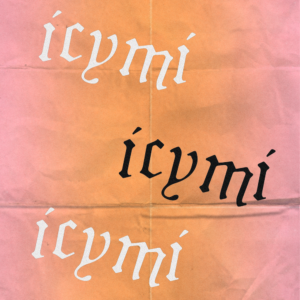Art by Julia Fletcher, find more of her work here.
Just last night I accidentally spent two hours scrolling through my For You page on TikTok. The time really just disappears and I always feel like shit afterward. TikTok is fucking toxic, but it’s also drastically and very quickly changing what kinds of music become popular.
So real quick, TikTok used to be musical.ly, that app where you could duet with other creators and in essence, publish your own “sounds.” It was bought by Chinese firm ByteDance in 2017 and musical.ly users were merged into the new rebranded app. While the name changed, the basic idea is still there, but the amount of creativity and influence each creator brings has evolved. It’s accumulated 800 million users in its three years of existence, putting it ahead of Twitter, Linkedin, and Snapchat.
Becoming viral on TikTok takes authenticity, creativity, and crafty use of hashtags, filters, and “sounds.” It’s paradoxical to think about how much the algorithm favors trends and originality simultaneously. It’s a mix of having real, honest to god talent and creativity, and hacking the system with those filters and your conventional attractiveness according to TikTok, read: skinny, young, pouty, and white. Yes, TikTok massively underserves POC and screens political content. It encourages young men and women to hate themselves as they are, as they’re served massively conventional beauty and are urged to participate in trends that depreciate their value as a person and reduce their bodies to things that should be examined and hated from every angle. It’s everything that’s wrong with the world.
With that paradox at hand, the songs, or “sounds” that get favored on TikTok are those that can be made into a trend, be it a dance, a joke, a green screen show-and-tell of a personal transformation, on and on. Weird lyrics or sound effects can get your sound posted thousands upon thousands of times. The top four on Billboard’s Top 100 this week (at the time of writing) are all TikTok trends. The top two, “Say So” and “Savage” are from relative newcomers Doja Cat and Megan Thee Stallion. These two songs are every-fucking-where on everyone’s For You page.
You’d expect to see Drake and a Nicki Minaj feature making it onto the viral charts, but TikTok has also generated some noise for bands you’d never expect to see here, like Russia’s Molchat Doma with their song “Sudno,” for instance.
“Sudno” became a trend for compilations, outfit showcases, and for mostly young privileged white creators to express a longing for an upbringing in Russia for the “aesthetic” of it. It became such a huge trend, because of the clueless desire for these kids to experience a childhood somewhere in Russia – such a sheltered and privileged way of thinking. Most of the kids or teens that have hopped on this trend are living in huge McMansions, sometimes straight-up mansions, with plenty of food to eat and, like, cool microwaves that pop out like a bread drawer at the touch of a button.
Actual teens from Russia responded like so:
“Why do so many people suddenly wanna live in Russia. I lived in Siberia for abt a year, and it wasn’t ‘Tumblr grunge vibes’ or whatever people think it’s like. It’s a lot like any other European country. In Russia, people are starving, and have no say in anything. You get punished for saying anything negative abt the gov. I want to visit my family, but I’m scared to get stuck there since I’m a citizen of Russia. Anyways, I don’t know what my point was, but ya.”
@annamatushevskiy
##russia ##russian ##russianmusic 🇷🇺
♬ Судно (Борис Рижий) – Molchat Doma
https://www.tiktok.com/embed.js
What’s even more messed up is that these same kids are either completely unaware of or simply do not care about the wealth gap in their own country, too.
But maybe it’s a good thing that these kids are giving themselves the opportunity to get called out like this, though; to give them a direct perspective from someone else less fortunate than themselves that otherwise would have gone unsaid?
On Tuesday night, users app-wide acknowledged the racial inequality and took it into their own hands with a blackout, urging anyone to like, and click “copy link” on any content from black creators, tricking the algorithm. While it’s terrible this has to happen, it IS cool that it actually worked — my FYP was full of black and POC creators, which it had never been before. Time will tell if this algorithm hack will make the platform into one that supports creativity in spite of someone’s race, or the aesthetic “beauty” of the background in which they create (A lot of reporting on this, such as this article in Business Insider, surfaced back in March), but it was really awesome to see users harnessing their power and knowledge of the app for good. Personally, I have continued to see more black users on my FYP, but comments have noted that this content is once again getting shadowbanned by moderators.
I’ve also noticed that TikTok comments are among the kindest, supportive, and most accepting out of any social media I’ve seen. Yes, there are some trolls, but it’s overwhelmingly positive. If creators keep using their ingenuity and understanding of what the app needs to succeed to perpetuate diverse, positive, multi-perspective content… this could be really cool.
It feels funny to talk about the music industry when black and POC creators are being suppressed by the moderators and by TikTok’s policy. It really does. But the same concepts translate, and the effects that this app and the control of its creators have is vastly affecting what hits the charts and who gets streamed. Last week (5/15), Molchat Doma was number two on the Global Viral 50 Spotify playlist, right behind JoeVille’s “Sexy,” also immediately recognizable from TikTok. The whole chart is.
So it seems that the viral charts are now entirely and exclusively reliant on whichever trends catch on in TikTok’s fucked up universe. The big question now is how will it affect the music industry and how artists approach their songwriting? Will it sincerely open a window for indie artists thanks to the algorithm, which is in part driven by creators’ simultaneous need to be uniquely their own original product while appealing to the severely corrupt app? While artists and marketing teams try to harness this power, gen Z has a firm grasp on the songs that will historically become the soundtrack for this moment in history, which, I’m sure you don’t need to be reminded, is a global fucking pandemic. They have also recognized the power that this app has given them to affect change and distribute visibility where it is due. It’s a brave new world that doesn’t have room for inauthenticity, which makes it difficult for some already-famous people and artists to gain traction on the app.
As I see it, the way for artists to benefit from TikTok isn’t necessarily to have a strong presence on the app, but rather to think creatively about how their music can be given to and accepted by this community of creators, so that they can then, in turn, make of it what they wish.










